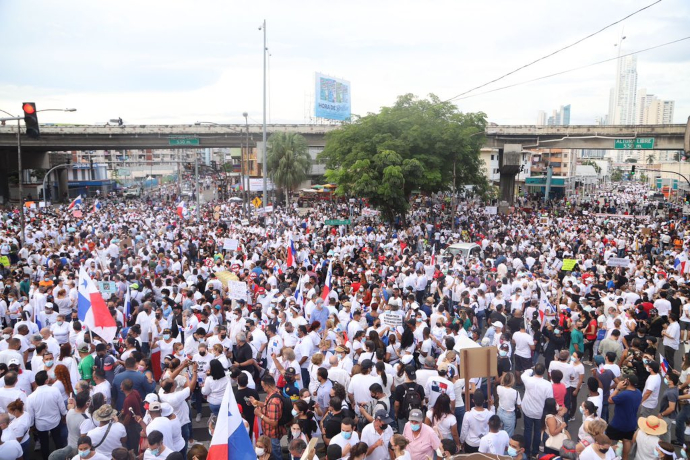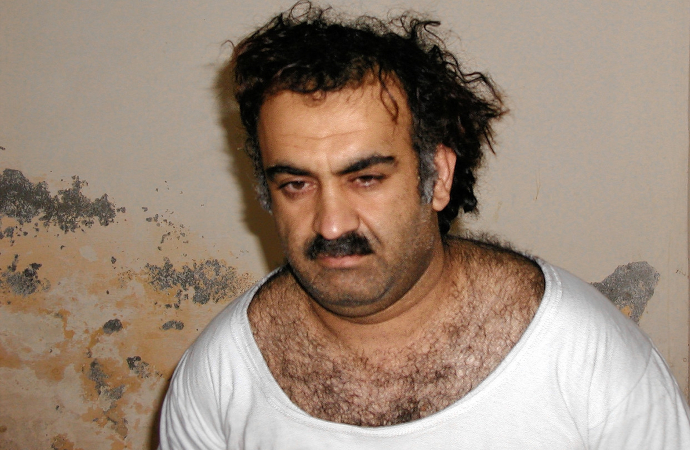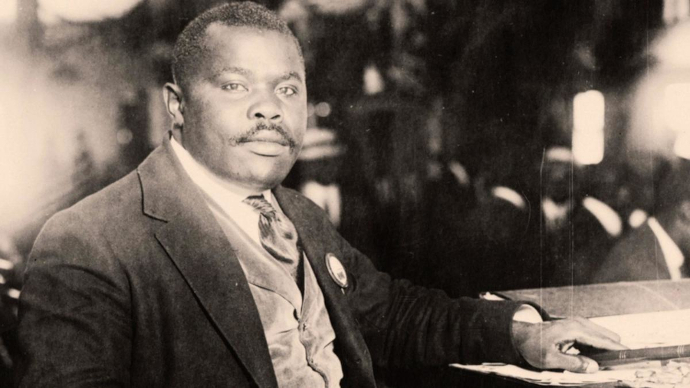Part of the September 14 crowd of protesters in front of the legislature. Photo from the Panameñistas’ Twitter feed.
Discount these people if you wish…
There are factions of the labor movement and of the left who stayed away. But many people who dislike some of those who backed this protest still agree on the specific issues that the protesters raised. Yes, there are folks on the political patronage gravy trains who agree with the protesters in their hearts but won’t say so because they may end up not knowing from whence comes their next meal.
The mathematics and intricacies of political maneuvering fly right over the heads of a great many Panamanians, even of those so engaged that they showed up at this protest. But what they do see of the political caste’s performance, they don’t like.
Call the discontented whatever names. Assign to them whatever motives. Discredit them by whatever associations you might want to make. They more or less represent most of Panama in their discontent.
Replace that with which they are disenchanted with what? A good question, and now is a good time to raise it, so long before the next scheduled elections. We the people, with all of our differences, need to talk about that.
Khalid Sheikh Mohammed, a mug shot taken shortly after his capture.
Slice through legal Gordian Knots
Refugee resettlement isn’t the only pending task facing the United States in the wake of the long Afghanistan War debacle. There are accountings to be given to the people of the United States and of the world. There are laws to uphold, in circumstances where systematic violation of the law make any proper legal process difficult to impossible. There are prisoners still held, a few of whom should be considered so dangerous that the world runs a great risk if it lets them walk away.
Consider the case of one Khalid Sheikh Mohammed, arrested in 2003 in Pakistan and reasonably thought to be the operational mastermind of the September 11, 2001 attacks on the United States. He’s still held in Guantanamo, charged with many things and facing a trial before a US military commission and potential death penalty. “KSM,” as this defendant’s name gets abbreviated, did not start his career in crimes against civil aviation with these spectacular attacks. A bomb placed on a Filipino airliner in a “test” he allegedly ordered some years before killed a Japanese passenger.
Do we say that it’s an American thing, thus the USA is the place where jurisdiction must lie? People of many nationalities lost their lives on the four hijacked and crashed airliners, and in the World Trade Center and in the Pentagon when those planes hit. Some 3,000 people died in those attacks, a little fewer if you consider immediate deaths, perhaps more if you consider those who died later from things like exposure to toxic dust in the clearance of the rubble. Among those immediately killed were 372 citizens of countries other than the United States, 61 countries in all. There were 105 citizens of Latin American nations killed. There were innocent people from five Muslim-majority countries killed, and other Muslims from countries where they were members of religious minorities. If the United States, due to the misconduct of its government, is precluded from doing justice in this case, wouldn’t dozens of other countries have standing to try the alleged perpetrators?
By US law, much or all of the evidence against KSM is inadmissible. The man was tortured. From Pakistan he was sent to a US facility in Afghanistan, where among the indignities to which he was subjected he was repeatedly sodomized with a water hose. Then he was sent to a secret CIA torture chamber in Poland, where he was waterboarded 183 times. The abuse continued at another secret prison in Romania, until his 2006 transfer to Guantanamo. Any confession obtained under torture is clearly inadmissible if there is any US concept of due process of law. But not only that. Information obtained indirectly, by investigations following up leads gleaned under torture, is the “fruit of a poisoned tree” and is also inadmissible.
While KSM was still on the lam, at US behest his two sons were arrested by Pakistanis and tortured. They were aged six and eight years old at the time. Food and water deprivation, and putting stinging ants on their bodies, were the tactics used to get them to give information that might lead to their father’s arrest. Perhaps, pursuant to US law, all evidence seized as part of that series of arrest was based at least in part on the torture of children and is also the fruit of a poisoned tree.
All this, without even getting to the matter of whether trial by a US institution could ever be impartial.
There is, however, an International Criminal Court in The Hague. The United States, in part out of fear of Americans being tried for torture and other war crimes before it, does not recognize this court. As a matter of practical politics it would take a two-thirds vote of the US Senate to ratify the treaty, and that’s not going to happen because by and large the Republicans oppose international law other than that which protects US companies’ overseas investments.
Let’s step back and look at the whole of international law. There are treaties made and ratified, but that is not its only pillar. Another pillar of International law is the writings of legal scholars, which include the decisions of tribunals in cases brought under treaties and otherwise, as well as treatises and declarations. Then the third main pillar is customary international law. A maritime nation like Panama would have some familiarity with customary laws like universal jurisdiction against sea pirates, and the law of general average to sort out the losses when part of a ship’s cargo is lost. Customary international law is not only recognized by US courts, but it has been applied to people, institutions and nations that don’t recognize the applicable treaties — things long codified in treaties like the Geneva Conventions are imposed on those who reject them as customary law. With the United States having failed to ratify the UN Law of the Sea Convention, it has nevertheless declared it customary international law.
We can look at alternative bodies of law to also determine what is customary. That might sound arcane, but with respect to jihadi groups it’s absolutely relevant. Islam’s Prophet Muhammad bin Abdullah was, later in his life, a head of state and wartime king. Before that he was a merchant engaged in international trade. International law is and always has been part of the Muslim Sharia law. Attacking and killing non-combatant civilians was forbidden by Muhammad and it’s a war crime against the Sharia in our time.
The way out of a legal conundrum, and a stride toward US legal respectability, would be to hand Khalid Sheikh Mohammed over to the International Criminal Court. It would be a prudent exercise in customary international law. Would the United States, as a non-signatory of the treaty creating that court, lack standing? Many of the 61 other countries whose citizens were killed would not face such an issue.
Uphold and extend the rule of law. Bring KSM to trial for what’s arguably The Crime of this Century – a fair trial before an impartial tribunal. Send him to The Hague.
Men who are in earnest are not afraid of consequences.
Marcus Garvey
Bear in mind…
Introverts live in two worlds: We visit the world of people, but solitude and the inner world will always be our home.
Jenn Granneman
If you do not tell the truth about yourself you cannot tell it about other people.
Virginia Woolf
Happiness exists on earth, and it is won through prudent exercise of reason, knowledge of the harmony of the universe, and constant practice of generosity.
José Martí
Contact us by email at fund4thepanamanews@gmail.com
To fend off hackers, organized trolls and other online vandalism, our website comments feature is switched off. Instead, come to our Facebook page to join in the discussion.
These links are interactive — click on the boxes















